 Tìm kiếm
Tìm kiếm
Phần thứ tư Luật xử lý vi phạm hành chính 2012: Các biện pháp ngăn chặn và bảo đảm xử lý vi phạm hành chính
| Số hiệu: | 15/2012/QH13 | Loại văn bản: | Luật |
| Nơi ban hành: | Quốc hội | Người ký: | Nguyễn Sinh Hùng |
| Ngày ban hành: | 20/06/2012 | Ngày hiệu lực: | 01/07/2013 |
| Ngày công báo: | 06/08/2012 | Số công báo: | Từ số 479 đến số 480 |
| Lĩnh vực: | Vi phạm hành chính | Tình trạng: | Còn hiệu lực |
TÓM TẮT VĂN BẢN
Điểm mới của Luật xử lý vi phạm hành chính
Ngày 20/6/2012 vừa qua, Quốc hội đã chính thức thông qua Luật xử lý vi phạm hành chính 2012. So với Pháp lệnh xử lý vi phạm hành chính, Luật ra đời có rất nhiều quy định mới, mức xử phạt cũng nặng hơn nhiều so với trước đây.
Theo đó, Luật quy định được phạt cao hơn nhưng tối đa không quá 2 lần mức phạt chung đối với cùng hành vi vi phạm trong 3 lĩnh vực: Giao thông đường bộ; Môi trường; An ninh trật tự, An toàn xã hội, đồng thời chỉ áp dụng tại khu vực nội thành của Thành phố trực thuộc TW. Mức phạt tiền trong xử phạt vi phạm hành chính (VPHC) dao động từ 50 nghìn đồng đến 1 tỷ đồng đối với cá nhân, từ 100 nghìn đồng đến 2 tỷ đồng đối với tổ chức.
Ngoài ra, việc tịch thu tang vật, phương tiện VPHC được áp dụng đối với các VPHC nghiêm trọng do lỗi cố ý của cá nhân, tổ chức. Việc tạm giữ phương tiện, giấy phép, chứng chỉ hành nghề theo thủ tục hành chính chỉ được áp dụng trong trường hợp thật cần thiết và chấm dứt ngay sau khi xác minh được tình tiết làm căn cứ quyết định xử phạt, hành vi vi phạm không còn nguy hiểm cho xã hội.
Bên cạnh đó, Nghị quyết 24/2012/QH13 thi hành Luật này cũng hướng dẫn không áp dụng biện pháp giáo dục tại xã, phường, thị trấn và đưa vào cơ sở chữa bệnh đối với người bán dâm.
Luật xử lý vi phạm hành chính 2012 có hiệu lực kể từ ngày 01/7/2013.
Văn bản tiếng việt
Văn bản tiếng anh
THE MEASURES TO PREVENT ADMINISTRATIVE VIOLATIONS AND ENSURE THE HANDLING THEREOF
GENERAL PROVISION ON THE MEASURES TO PREVENT ADMINISTRATIVE VIOLATIONS AND ENSURE THE HANDLING THEREOF
Article 119. The measures to prevent administrative violations and ensure the handling thereof
In case need timely prevent administrative violations or in order to ensure the handling of administrative violations, the competent persons may apply the following measures according to administrative procedures:
1. Custody of involved persons;
2. Escorting the violator;
3. Custody of material evidences and/or means of the administrative violations, permits, or professional practice certificates;
4. Body search;
5. Inspection of transport means and objects;
6. Search of places where material evidences and/or means of administrative violations are hidden;
7. Management of foreigners who have violated Vietnamese law while the expulsion procedures are carried out;
8. Assigning family, organization to manage the person who is proposed to apply the administrative handling measures while the procedures for application of administrative handling measures are carried out;
9. Hunting for subjects who have to serve decisions on sending to reformatories, compulsory education establishments or compulsory detoxification establishments if they escape.
Article 120. The application principles of measures to prevent administrative violations and ensure the handling thereof
1. When applying measures to prevent administrative violations and ensure the handling thereof, the competent persons must strictly obey by provisions on artices from 120 to 132 of this Law, if violating, they shall be handled as prescribed by law.
2. Just applying measures to prevent administrative violations and ensure the handling thereof in necessary cases as prescribed in Chapter II of this part.
3. The person who issuring decision on applying measures to prevent administrative violations and ensure the handling thereof, must be responsible for his/her decision.
4. Using weapon, supporting tools in application of measures to prevent administrative violations and ensure the handling thereof, must be comply with provisions of law.
Article 121. The cancellation or replacement of measures to prevent administrative violations and ensure the handling thereof
1. In case application of measures to prevent administrative violations and ensure the handling thereof is not conformable to purpose and application condition as prescribed by this Law, the decision on application of such measure must be cancelled.
2. The persons who have authority to decide application of measures to prevent administrative violations and ensure the handling thereof shall decide cancellation of measures to prevent administrative violations when such measures are not neccesary or replace them by other an other measures to prevent administrative violations.
THE AUTHORITIES OF AND PROCEDURES FOR APPLICATION OF MEASURES TO PREVENT ADMINISTRATIVE VIOLATIONS AND ENSURE THE HANDLING THEREOF
Article 122. Custody of involved persons according to administrative procedures
1. Custody of involved persons according to administrative procedures is just applied in cases need prevent, stop immediately acts causing public disturbance, causing injury to other persons.
2. All cases of human custody must be decided in writing and copies of the decisions must be handed over to the persons subject to custody, each with one copy thereof.
3. The time limit for human custody according to administrative procedures must not exceed 12 hours; in case of necessity, the custody time limit can be prolonged but must not exceed 24 hours as from the starting time of custody of the violators;
For persons who violate border regulations or commit administrative violations in distant, secluded mountain or island areas, the custody time limit may be longer, but must not exceed 48 hours as from the starting time of custody of the violators;
For the person who be kept on airplane or ship must transfer immediately to competent agencies when the airplane landed airport or ship arrived port.
4. At the request of person in custody, the person issuing decision on custody must notify to his/her family, organization where working or studying there of. In case custody of minors committed administrative violations atnoght or custody over 06 hours, the person issuing decision on custody must notify immediately to their parents or guardian thereof.
5. The places used for custody person according to administrative procedures are administrative custody house or room which is arranged in headoffice of agencies, units where working of person having authority for issuance of decision on custody of administrative violation persons. If there is no administrative custody house or room, custody places may be watchkeeping rooms or other rooms in working place, but must ensure general provisions.
Agencies with function of preventing law violations which must regularly keep persons committed administrative violations in custody need arrange, design and build the administrative custody houses or private rooms, which need have separate custody places for minors, woman or foreigners and must have specialized officers to manage and protect.
For airplanes, ships, trains which have left out airports, harbors, stations, depending on specific condition and subjects committed violations, the commanders of airplanes, captains, heads of train shall decide the custody places and assign person to be in charge of custody.
6. To strictly prohibite custody of persons committed administrative violations in criminal custody rooms, detaining rooms or places not ensure hygien, safety for the person subject to custody.
7. The Government shall prescribe custody of involved persons according to administrative procedures.
Article 123. Authorities of custody of involved persons according to administrative procedures
1. In cases a person has acts causing public disturbance, causing injury to other persons specified in clause 1 Article 122 of this Law, the following persons have right to decide custody of involved persons according to administrative procedures.
a) Presidents of commune-level People’s Committee, ward police heads;
b) District Police Heads;
c) The heads of the Police Bureaus for Administrative Management of Social Order, heads of the Police Bureaus for order, heads of the Police Bureaus for traffic in roadway, railway, heads of the Police Bureaus for waterway, heads of the Police Bureaus for Investigating Drug-related Crimes, heads of Exit and Entry Management Bureaus under provincial-level Police Department; heads of the Police Bureaus for Criminal-Judgment Execution and Justice Support, heads of the Police Bureaus for Prevention and Combat of Environmental Crimes;
d) Heads of Mobile Police units of the company or higher level, heads of the Police Stations at border gates;
dd) The heads of the Ranger units, leaders of the Mobile Ranger teams;
e) The heads of the Customs Sub- Departments, the leaders of the Control Teams of the Customs Departments, the leaders of the Anti-Smuggling Inspection Teams and the leaders of the sea patrol flotillas under the Anti-Smuggling Investigation Department of the General Department of Customs;
g) The leaders of the Market Management teams;
h) The commanders of the border sub-regions, the commanders of the port border-gate, the commanders of the border fleets, commanders of the border flotillas, the heads of the border posts and the commanders of the border guard units stationing in border and island regions;
i) Commanders of the Coast Guard flotillas, fleets, regional commnaders of coast guard;
k) Airplane or ship captains or heads of trains when airplanes or ships leave airports or sea ports, stations;
l) The judges chairing the court sessions.
2. The persons competent to custody of involved persons specified from a to i clause 1 of this Article may delegate for their deputies. The delegating is just performed when the leaders being absent and must be presented in writing, in which clearly defining the delegated scope, content, time limit. The deputies being delegated must be responsible for their decisions before the leaders and before the law. The delegated persons are not allowed to further delegate or authorize for any other individual.
Article 124. Escorting the violators
1. If the violators not voluntarily observe the request of competent persons, they shall be escorted in the following cases:
a) Being subject to custody of involved persons according to administrative procedures;
b) Sending back to reformatories, compulsory education establishments, compulsory detoxification establishments as prescribed in clause 2, Article 132 of this Law.
2. The competent persons on duty implement escorting the violators.
3. The Government provides in details escorting the violators.
Article 125. Custody of material evidences and/or means of the administrative violations, permits, professional practice certificates according to administrative procedures
1. The custody of material evidences and/or means of the administrative violations, permits, and professional practice certificates according to administrative procedures are applied just in the following realy necessary cases:
a) In order to certify facts which if not custody, there shall be not base to issue sanctioning decision. In case custody for evaluate material evidences of the administrative violations serve as basic to define the fine bracket, the authority to impose sanctions, provisions of clause 3, article 60 of this Law shall be applied;
b) In order to prevent immediately acts of administrative violations which if not custody, may cause serious consequences for society;
c) In order to ensure execution of decisions sanctioning administrative violation as prescribed in clause 6 of this Article.
2. The custody of material evidences and/or means of the administrative violations specified in clause 1 of this Article must be terminated right after verifying facts as the basis for deciding sanction, the violation acts no longer cause danger for society or the sanctioning decision is executed.
In case being allow to pay fines for many times as prescribed in Article 79 of this Law, after paying fines for first time, the violator may be receive material evidences and/or means of the administrative violations subject to custody.
3. The persons competent to apply sanctions forms of custody of material evidences and/or means of administrative violations as prescribed in Chapter II, the second Part of this Law shall have authority to custody of material evidences and/or means used for administrative violations.
4. In cases there are grounds to assume that if not custody immediately, material evidences and/or means of administrative violations may be dispersed, destroyed, the direct heads of people’s police officers, police members of the Coast Guard, the Border guard combatants, ranger officers, customer officials, market controllers who are on official duty must perform immediately custody of material evidences and/or means of administrative violations. Within 24 hours, after making records, the record makers must report to their heads who are persons competent to custody of material evidences and/or means of administrative violations specified in clause 1 of this Article, in order to consider and issue decision on custody; for cases material evidences are perishable goods, the persons who are temporarily keeping goods must report immediately to their heads for settlement, if let goods be spoiled or lost, they must pay compensation as prescribed by law. If not issuing decision on custody, material evidences and/or means of administrative violations subject to custody must be repay back immediately.
5. The persons who issuing decision on custody of material evidences and means of administrative violations, shall preserve such material evidences and means of administrative violations. In case material evidences and means of administrative violations are lost, sold, swapped or faulted, their components are lost, replaced, the person who issuing decision on custody of material evidences and means of administrative violations, must have responsibility for paying compensation and handled as prescribed by law.
Where the material evidences and/or means need to be sealed, the sealing thereof must be conducted immediately in front of the violators; if the violators are absent, the sealing must be conducted in front of their families' representatives, organizations’ representatives, the administrations’ representatives and the witnesses.
The custody of material evidences and/or means of administrative violations must be effected by written decisions which must be enclosed with records on the custody and handed over to the violators or representatives of the violating organizations, each with one copy thereof.
6. Where the sanctioning form of fine is applied only to violating individuals or organizations, the persons with sanctioning competence may temporarily seize one of papers of kinds under order as follows: the driving licenses or permits for circulation of means or other necessary relevant papers related to material evidences and/or means of violations until such individuals or organizations completely execute the sanctioning decisions. If the violating individuals or organizations do not have the above-mentioned papers, the persons with sanctioning competence may temporarily seize the material evidences and/or means of violations, except for case specified in clause 10 of this Article.
7. The individuals, organizations violating administrative violations in cases subject to application of forms of sanctions of depriving the right to use permits, professional practice certificates may be temporarily seized permits, professional practice certificates in order to ensure execution of sanctioning decision. The temporarily seizing permits, professional practice certificates while issuing decision not influence the use right of permits, professional practice certificates of such individuals, organizations.
8. The time limit of temporarily seizing material evidences and/or means of violations, permits, or professional practice certificates is 07 days, after day of temporarily seizing. The time limit of temporarily seizing may be prolonged for cases with complex facts, need verify but not exceeding 30 days, as from the days of temporarily seizing material evidences, permits, professional practice certificates.
For cases specified in paragraph 2, clause 1, Article 66 of this Law, which need have more time to certify, the competent persons solving cases must report to their direct heads in writing in order to request for extension of temporary seize; the extension must presented in writing, time limit of extension not exceeding 30 days.
The time limit of temporarily seizing material evidences and/or means of violations, permits, professional practice certificates is calculated from time point when material evidences and/or means of violations, permits, professional practice certificates are temporarily seized in reality.
The time limit of temporarily seizing material evidences and/or means of violations, permits, professional practice certificates not exceeding time limit of issuing decision on sanctioning administrative violations specified in Article 66 of this Law, except from case specified in point c, clause 1 of this Article.
9. All cases of temporarily seizing material evidences and/or means of violations, permits, or professional practice certificates must be make records. In records must indicate name, quantity, kinds, condition of temporarily-seized material evidences and/or means and must have signatures of the person issuing decision on custody, of violators; if it fails to define violators, the violators are absent or do not sign, there must be signatures of 02 witnesses. The record must be made into 02 copies, the person competent to custody keeps 01 copy, the violator keeps 01 copy.
10. For means of transport which have caused administrative violations in cases being seixed in order to ensure execution of decision on sanctioning administrative violations, if the violating organizations, individuals have clear address, have condition of yard-storage for preserving means or financial ability to pay guarantee amounts, they may allow to keep the means of violations under management of the competent state agencies.
The Government shall prescribe in details this clause.
Article 126. The handling of temporarily seized material evidences and/or means, permits, professional practice certificates according to administrative procedures
1. The person issuing decision on temporarily custody must handle the seaized material evidences and/or means, permits, professional practice certificates under record indicated in the sactioning decision or repay for individuals, organizations if the sanctioning form of confiscating the custody material evidences and/or means, the sanctioning form of stripping off the right to use permits, professional practice certificates are not applied.
For material evidences and/or means being seized are appropriated, illegally used for administrative violations in cases being confiscated, they shall be returned for their owners, managers or legal users. In this case, the violating individuals, organizations must pay an amount equivalent to value of violation material evidences and/or means into the State budget.
If the owners, managers, or legal users have intentional fault in using material evidences and/or means of the violators as prescribed in Article 26 of this Law, such material evidences and/or means shall be confiscated in order to remit to the State budget.
2. For temporarily seized material evidences and/or means, permits, professional practice certificates in order to ensure execution of sanctioning decision according to clause 6 Article 125 of this Law, they must be retured for the sanctioned person after finished execution of sanctioning decision.
3. For material evidences of administrative violations are perishable goods, products, the person issung decision on temporarily seizing must immediately sell under market price and the sale must be made in record. The collected amounts must be sent to a temporarily-deposit account at State Treasuries. If after that, under decision of competent persons, such material evidences are confiscated, the collected amounts must be remitted into the State budget, if such material evidences are not confiscated, the collected amounts must be returned to the owners, managers, or legal users.
4. For material evidences, means of administrative violations which have been over time limit of temporarily seizing, if the violator does not come to receive them and has no ligetimated reason or case of failing to define the violator, the person issuing decision on temporarily seizing must notify on means of mass media and list public at headquater of agency of the person competent to seizing; within 30 days, after notifying, and public listing, if the violators does not come to receive, the competent person must issue decision on confiscating material evidences, means of administrative violations for handling as prescribed in Article 82 of this Law.
5. For material evidences, means of administrative violations which are goods, products causing harmful for human health, domestic animals, plants and environment, or are harmful cultural products, they must be destroyed as prescribed in Article 33 of this Law.
6. For narcotics and objects of types banned from circulation, they shall be confiscated or destroyed as prescribed in Article 33 and Article 82 of this Law.
7. The person having impulsorily-seized material evidences, means of administrative violations must pay onle expenses for warehousing, yard-storage and preservation of material evidences and means of administrative violations and other expenses in duration of temporaily seizing material evidences, means of administrative violations as prescribed in clause 8, Article 125 of this Law.
Not collecting charges of warehousing, yard-storage and preservation expenses in duration of temporaily seizing material evidences, means of administrative violations if the owners of material evidences, means have no fault in administrative violations or when applying measure of confiscating material evidences, means.
The Government prescribed in details about charge levels of impulsorily-seizing material evidences, means specified in Article 125 of this Law.
Article 127. The body search according to administrative procedures
1. The body search according to administrative procedures may be implemented only when having grounds for presuming that the person hiding objects, documents, means used in order to commit acts of administrative violation in his/her body.
2. The persons specified in clause 1, Article 123 of this Law have right to decide the body search according to administrative procedures.
In case there are grounds in order to assume that if not immediately perform search, objects, documents, means used in order to commit administrative violations shall be dispersed, destroyed, beside of persons specified in clause 1, Article 123 of this Law, people’s police officers, members of the CoastGuard operation teams, Border Guard combatants, ranger officers, customs officials, market controllers, who are on official duty, may implement the body search according to administrative procedures and immediately report in writing to their heads who are one of persons specified in clause 1, Article 123 of this Law and must take responsibilities before law for the body search.
3. The body search must be decided in writing, unless it needs to immidiately search as prescribed ai paragraph 2, clause 2 of this Article.
4. Before implement the body search, the searching persons must notify of decision to the searched person. When implement the body search, men shall search men and women search women, and the search must be witnessed by persons of the same sex.
5. All cases of body search must be recorded in writing. The body search decisions and records must be handed over to the searched persons, one copy each.
Article 128. Searching transport means and objects according to administrative procedures
1. The search of transport means and objects according to administrative procedures shall be carried out only when there are grounds to believe that hidden in those transport means and/or objects are material evidences of administrative violations.
2. Persons defined in clause 1 Article 123 of this Law have rights to carry out the search of transport means and objects according to administrative procedures.
3. In case there are grounds in order to believe that if not immediately perform search, material evidences of administrative violations shall be dispersed, destroyed, beside of persons specified in clause 2 of this Article, people’s police officers, members of the CoastGuard operation teams, Border Guard combatants, ranger officers, tax officials, market controllers, or inspectors, who are on official duty, may search transport means and objects according to administrative procedures and immediately report to their heads and must take responsibilities for the search.
4. The search of transport means and objects must be decided in writing, unless cases specified in clause 3 of this Article.
The search of transport means and/or objects must be carried out in the presence of the transport means and/or object owners or the transport means operators and a witness; where the transport means and/or object owners or the transport means operators are absent, there must be two witnesses.
5. All cases of search of transport means and/or objects must be recorded in writing. The search decision and record must be handed to transport means and/or objects owners or the transport means operators, one copy each.
Article 129. Search of places where material evidences and/or means of administrative violations are hidden
1. The Search of places where material evidences and/or means of administrative violations are hidden shall be carried out only when there are grounds to believe that hidden material evidences and/or means of administrative violations.
2. The persons specified in clause 1, Article 123 of this Law have right to decide search of places where material evidences and/or means of administrative violations are hidden; where such places are dwelling places, proposing the district-level People’s Committee presidents for consideration and decision.
3. The search of places where material evidences and/or means of administrative violations are hidden must be conducted in the presence of the owners of such places or major members of their families and the witnesses. Where the place owners or major members of their families are absent while the search cannot be postponed, there must be the representative of the local administration and two witnesses.
4. The search of places where material evidences and/or means of administrative violations are hidden must not be conducted at night, except for emergency cases, or the search is being conducted and having not yet finished but the reasons therefor must be clearly stated in the records thereof.
5. All cases of search of places where material evidences and/or means of administrative violations are hidden must be affected under written decisions and must be recorded in writing. Such decisions and records on the search of places where material evidences and/or means of administrative violations are hidden must be handed to the place owners, one copy each.
Article 130. Management of foreigners who have violated Vietnamese laws during the time of carrying out the procedures for their expulsion
1. Management of foreigners who have violated Vietnamese laws during the time of carrying out the procedures for their expulsion shall be applied when there are grounds to believe that in not applying this measure, such persons may evade or obstruct the execution of decision on expulsion sanctioning or to prevent such persons continuing to commit acts of law violation.
2. The heads of Exit and Entry management agencies or the directors of principle-level Police departments where compiling dossier proposing expulsion shall issue decision on management of foreigners who have violated Vietnamese laws during the time of carrying out the procedures for their expulsion by the following measures:
a) To limit traveling of the persons subject to management;
b) To appoint dwelling places of the persons subject to management;
c) To temporarily seize passports or other personal papers replacing for passports.
3. The Government shall prescribe in details this clause.
Article 131. To assign family, organization to manage the person who is proposed for application of measure on administrative sanctioning during carrying out procedures for application of administrative handling measures
1. During carrying out procedures for consideration, decision on application of measures sending to the reformatories, sending to compulsory educational establishment, sending to compulsory detoxification establishments, the Presidents of the commune-level People’s Committee where compiling dossier shall decide on assigning family or social organization to manage persons who committed acts of law violation being subjects of application of these measures.
2. The violating subjects with stable residence shall be assigned to their family for management; if there is no stable residence, subjects shall be assigned to social organizations for management.
3. The time limit of management is counted from making dossier untill the competent persons take subjects to go for application of administrative handling measures according to decision of the Courts.
4. The decision on assigning family or social organizations for management must clearly state: date of issuing decision; full name, title of the deciding person; full name, date of birth and residence of person assigned for management or name and address of social organization assigned for management; full name, date of birth, and residence of person being subject to management; reason, time limit, responsibilities of the person subject to management, responsibilities of the person or organization of management and responsibilities of the commune-level People’s Committee where the subject residents; signature of person deciding on management assignment. This decision must be sent immediately to family or social organization where accept management, and the person being subject to management for implementation.
5. During management, the family or social organization which is assigned for management has the following responsibilities:
a) Not let the person being subject to management continuing law violations;
b) To ensure the presentation of the person being subject to management when having decsion on sending to reformatories, sending to compulsory educational establishments, or sending to compulsory detoxification establishments;
c) To timely report to the President of the commune-level People’s Committee issuing decision on management assignment in case the person being subject to management flees or commits acts of law violation;
6. During management, the person being subject to management has the following responsibilities:
a) To strictly execute provisions of law on temporary residence, absence-from-residence. When leaving local area of commune, ward, town in order to stay in other local area, must notify to family, social organization assigned for management about address, duration of temporary residence at there;
b) To timely being present at headquarter of commune-level People’s Committee as requested by the President of commune-level People’s Committee.
7. During management, the President of commune-level People’s Committee where managing subjects specified in clause 1 of this Article has the following responsibilities:
a) To notify to family, social organization being assigned for management and the person being subject to management about their rights and obligations during management;
b) To implement the measures to assist for family, social organization assigned for management in management, supervision of the person being subject to management at residence;
c) When being notified that the person being subject to management have fled from residence or have committed acts of law violation, the President of the commune-level People’s Committee must immediately notify to the district-level police agency in order to have timely handling measures as prescribed by law.
8. The Government shall prescribe in details this clause.
Article 132. Hunting for subjects who have had decisions on sending to reformatories, compulsory education establishments or compulsory detoxification establishments in case they escape
1. In case persons who have had decisions on sending to reformatories, compulsory education establishments or compulsory detoxification establishments escape before being sent to reformatories or establichments, the dictrict-level police agencies where compiling dossier shall issue decision on hunting subjects.
2. In case persons who have served decisions in reformatories, compulsory education establishments or compulsory detoxification establishments escape, the principals of reformatories, directors of compulsory education establishments or directors of compulsory detoxification establishments shall issue decision on hunting subjects. The police agencies shall coordinate with reformatories, compulsory education establishments or compulsory detoxification establishments in hunting such subjects in order to bring back reformatories or establishments.
3. For persons having decision on sending to reformatories or serving decision at reformatories specified in clause 1 of this Article, if after finding, such persons have been enough 18 years old, the principals of reformatories shall suggest the district-level People’s Court where having reformatories to consider, decide on application of measure sending to the compulsory education establishments if they are eligible to send to compulsory education establishments.
4. The period of fleeing shall not be counted in time limit of servicing decision on application of measures sending to reformatories, sending to compulsory education establishments or sending to compulsory detoxification establishments.
Văn bản liên quan
Cập nhật
Điều 3. Nguyên tắc xử lý vi phạm hành chính
Điều 6. Thời hiệu xử lý vi phạm hành chính
Điều 12. Những hành vi bị nghiêm cấm
Điều 17. Trách nhiệm quản lý công tác thi hành pháp luật về xử lý vi phạm hành chính
Điều 18. Trách nhiệm của thủ trưởng cơ quan, đơn vị trong công tác xử lý vi phạm hành chính
Điều 21. Các hình thức xử phạt và nguyên tắc áp dụng
Điều 24. Mức phạt tiền tối đa trong các lĩnh vực
Điều 26. Tịch thu tang vật, phương tiện vi phạm hành chính
Điều 28. Các biện pháp khắc phục hậu quả và nguyên tắc áp dụng
Điều 38. Thẩm quyền của Chủ tịch Ủy ban nhân dân
Điều 39. Thẩm quyền của Công an nhân dân
Điều 40. Thẩm quyền của Bộ đội biên phòng
Điều 41. Thẩm quyền của Cảnh sát biển
Điều 43. Thẩm quyền của Kiểm lâm
Điều 44. Thẩm quyền của cơ quan Thuế
Điều 45. Thẩm quyền của Quản lý thị trường
Điều 46. Thẩm quyền của Thanh tra
Điều 47. Thẩm quyền của Cảng vụ hàng hải, Cảng vụ hàng không, Cảng vụ đường thuỷ nội địa
Điều 48. Thẩm quyền của Toà án nhân dân
Điều 49. Thẩm quyền của cơ quan thi hành án dân sự
Điều 62. Chuyển hồ sơ vụ vi phạm có dấu hiệu tội phạm để truy cứu trách nhiệm hình sự
Điều 63. Chuyển hồ sơ vụ vi phạm để xử phạt hành chính
Điều 65. Những trường hợp không ra quyết định xử phạt vi phạm hành chính
Điều 68. Nội dung quyết định xử phạt vi phạm hành chính
Điều 71. Chuyển quyết định xử phạt để tổ chức thi hành
Điều 74. Thời hiệu thi hành quyết định xử phạt vi phạm hành chính
Điều 78. Thủ tục nộp tiền phạt
Điều 79. Nộp tiền phạt nhiều lần
Điều 81. Thủ tục tịch thu tang vật, phương tiện vi phạm hành chính
Điều 86. Cưỡng chế thi hành quyết định xử phạt vi phạm hành chính
Điều 88. Thi hành quyết định cưỡng chế
Điều 94. Đối tượng áp dụng biện pháp đưa vào cơ sở giáo dục bắt buộc
Điều 96. Đối tượng áp dụng biện pháp đưa vào cơ sở cai nghiện bắt buộc
Điều 97. Lập hồ sơ đề nghị áp dụng biện pháp giáo dục tại xã, phường, thị trấn
Điều 98. Quyết định áp dụng biện pháp giáo dục tại xã, phường, thị trấn
Điều 99. Lập hồ sơ đề nghị áp dụng biện pháp đưa vào trường giáo dưỡng
Điều 101. Lập hồ sơ đề nghị áp dụng biện pháp đưa vào cơ sở giáo dục bắt buộc
Điều 103. Lập hồ sơ đề nghị áp dụng biện pháp đưa vào cơ sở cai nghiện bắt buộc
Điều 122. Tạm giữ người theo thủ tục hành chính
Điều 123. Thẩm quyền tạm giữ người theo thủ tục hành chính
Điều 124. Áp giải người vi phạm
Điều 125. Tạm giữ tang vật, phương tiện, giấy phép, chứng chỉ hành nghề theo thủ tục hành chính
Điều 128. Khám phương tiện vận tải, đồ vật theo thủ tục hành chính
Điều 129. Khám nơi cất giấu tang vật, phương tiện vi phạm hành chính
Điều 5. Đối tượng bị xử lý vi phạm hành chính
Điều 18. Trách nhiệm của thủ trưởng cơ quan, đơn vị trong công tác xử lý vi phạm hành chính
Điều 66. Thời hạn ra quyết định xử phạt vi phạm hành chính
Điều 125. Tạm giữ tang vật, phương tiện, giấy phép, chứng chỉ hành nghề theo thủ tục hành chính
Điều 128. Khám phương tiện vận tải, đồ vật theo thủ tục hành chính
Điều 3. Nguyên tắc xử lý vi phạm hành chính
Điều 5. Đối tượng bị xử lý vi phạm hành chính
Điều 18. Trách nhiệm của thủ trưởng cơ quan, đơn vị trong công tác xử lý vi phạm hành chính
Điều 28. Các biện pháp khắc phục hậu quả và nguyên tắc áp dụng
Điều 46. Thẩm quyền của Thanh tra
Điều 83. Quản lý tiền thu từ xử phạt vi phạm hành chính, chứng từ thu, nộp tiền phạt
Điều 5. Đối tượng bị xử lý vi phạm hành chính
Điều 21. Các hình thức xử phạt và nguyên tắc áp dụng
Điều 97. Lập hồ sơ đề nghị áp dụng biện pháp giáo dục tại xã, phường, thị trấn
Điều 99. Lập hồ sơ đề nghị áp dụng biện pháp đưa vào trường giáo dưỡng
Điều 101. Lập hồ sơ đề nghị áp dụng biện pháp đưa vào cơ sở giáo dục bắt buộc
Bài viết liên quan
Nồng độ cồn xe máy bao nhiêu thì không bị phạt mới nhất 2025?

Nồng độ cồn xe máy bao nhiêu thì không bị phạt mới nhất 2025?
Nồng độ cồn bao nhiêu khi lái xe máy thì không bị phạt? Đây là câu hỏi nhiều người thắc mắc khi tham gia giao thông sau khi uống rượu bia. Bài viết này sẽ cung cấp thông tin chi tiết về mức nồng độ cồn cho phép theo quy định pháp luật Việt Nam hiện hành, giúp bạn hiểu rõ và tránh vi phạm khi điều khiển phương tiện. 21/01/2025Nồng độ cồn bao nhiêu thì bị phạt vi phạm giao thông mới nhất 2025?
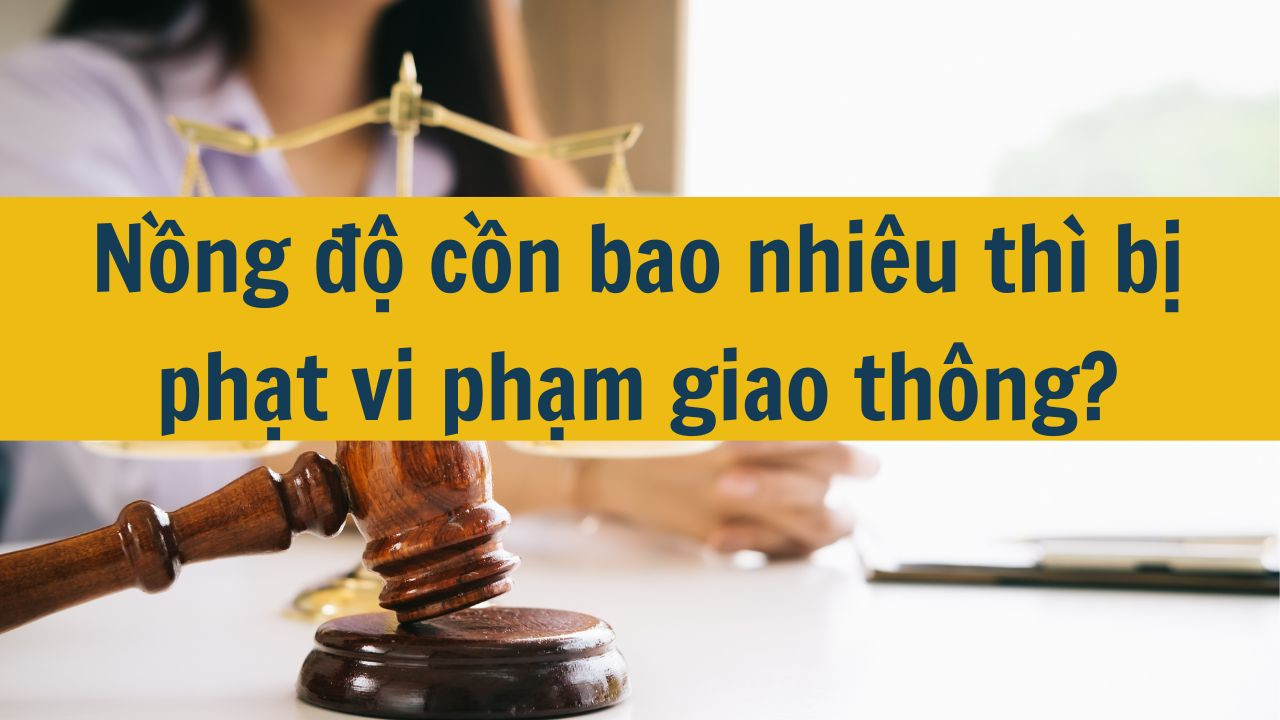
Nồng độ cồn bao nhiêu thì bị phạt vi phạm giao thông mới nhất 2025?
Nồng độ cồn bao nhiêu thì bị phạt vi phạm giao thông? Đây là câu hỏi được nhiều người quan tâm, đặc biệt khi các quy định xử phạt vi phạm nồng độ cồn ngày càng nghiêm ngặt. Bài viết này sẽ cung cấp thông tin chi tiết về mức nồng độ cồn cho phép, các mức xử phạt tương ứng và những lưu ý quan trọng để bạn tham gia giao thông an toàn và đúng luật. 21/01/2025Nồng độ cồn là gì? Có nồng độ cồn dưới ngưỡng vi phạm thì có bị phạt không mới nhất 2025?

Nồng độ cồn là gì? Có nồng độ cồn dưới ngưỡng vi phạm thì có bị phạt không mới nhất 2025?
Nồng độ cồn là gì? Có nồng độ cồn dưới ngưỡng vi phạm thì có bị phạt không? Đây là câu hỏi mà nhiều người tham gia giao thông quan tâm. Bài viết này sẽ giải thích rõ khái niệm nồng độ cồn, quy định pháp luật hiện hành và mức xử phạt khi điều khiển phương tiện giao thông có nồng độ cồn dưới ngưỡng quy định. Cùng tìm hiểu để lái xe an toàn và đúng pháp luật! 21/01/2025Uống rượu bia mà nồng độ cồn 0,096 miligam/1 lít khí thở khi lái xe máy tham gia giao thông sẽ bị xử phạt thế nào mới nhất 2025?
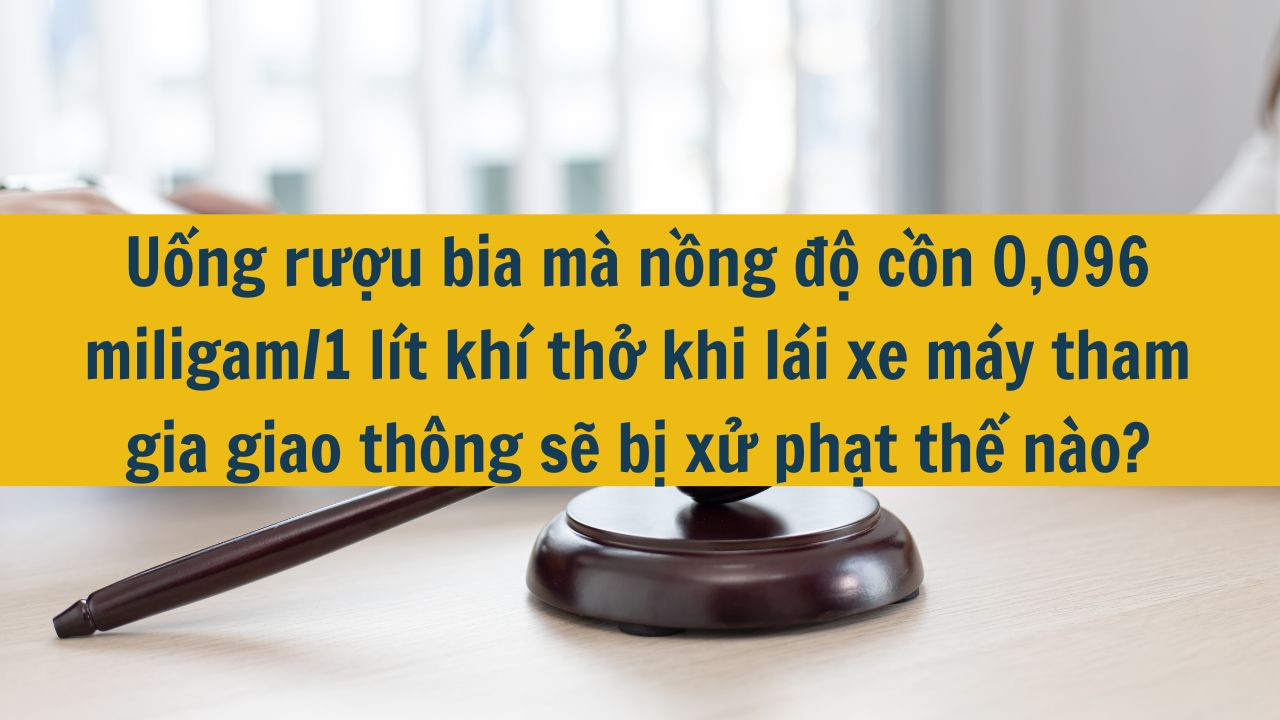
Uống rượu bia mà nồng độ cồn 0,096 miligam/1 lít khí thở khi lái xe máy tham gia giao thông sẽ bị xử phạt thế nào mới nhất 2025?
Việc điều khiển xe máy khi trong hơi thở có nồng độ cồn 0,096 miligam/lít khí thở vi phạm quy định pháp luật về an toàn giao thông đường bộ. Vậy với mức vi phạm này, người lái xe sẽ bị xử phạt như thế nào? Bài viết dưới đây sẽ cung cấp thông tin chi tiết về mức phạt, các hình thức xử lý và những lưu ý quan trọng mà người tham gia giao thông cần biết. 21/01/2025Quy định nào cấm lái xe khi đã uống rượu bia mới nhất 2025?
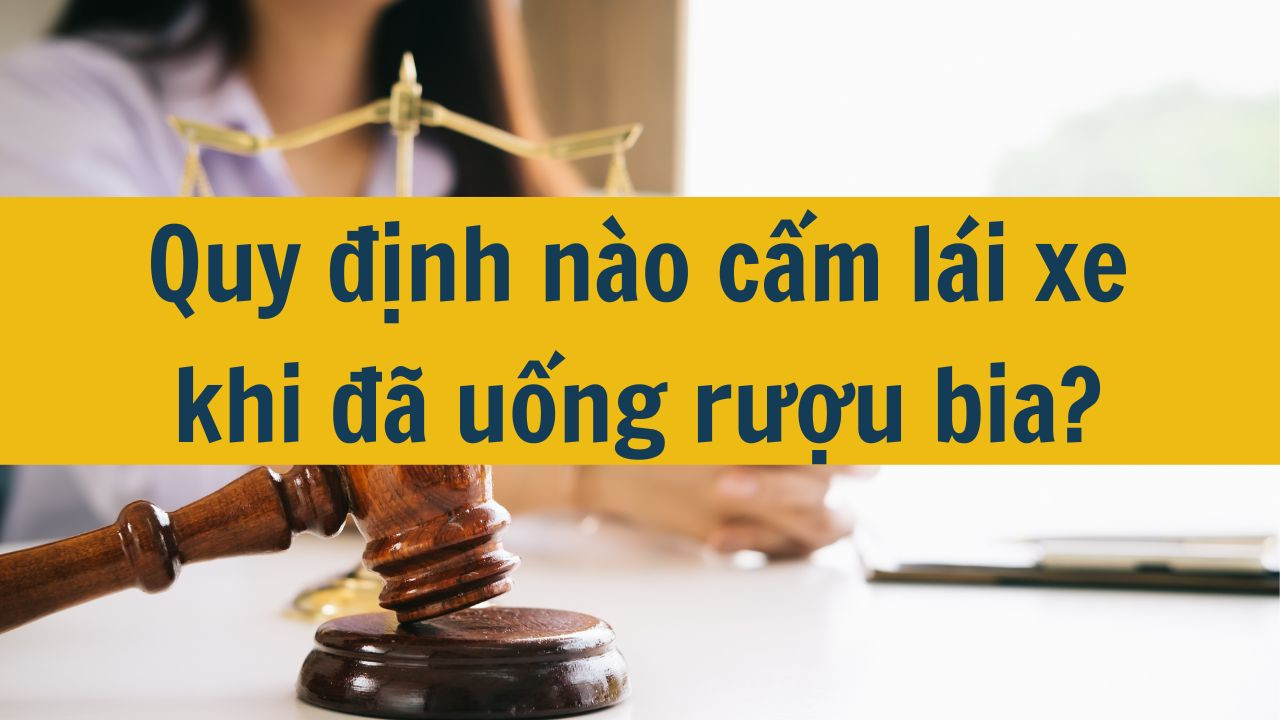
Quy định nào cấm lái xe khi đã uống rượu bia mới nhất 2025?
Lái xe sau khi uống rượu bia là hành vi bị pháp luật nghiêm cấm nhằm đảm bảo an toàn giao thông và tính mạng con người. Vậy quy định cụ thể nào cấm lái xe khi đã sử dụng rượu bia? Mức xử phạt đối với người vi phạm ra sao? Hãy cùng tìm hiểu chi tiết trong bài viết dưới đây để nắm rõ quy định và tránh những hậu quả đáng tiếc 21/01/2025Uống rượu bia bao nhiêu thì sẽ không bị phạt khi lái xe máy tham gia giao thông? Hay tất cả trường hợp có uống rượu bia đều bị phạt mới nhất 2025?
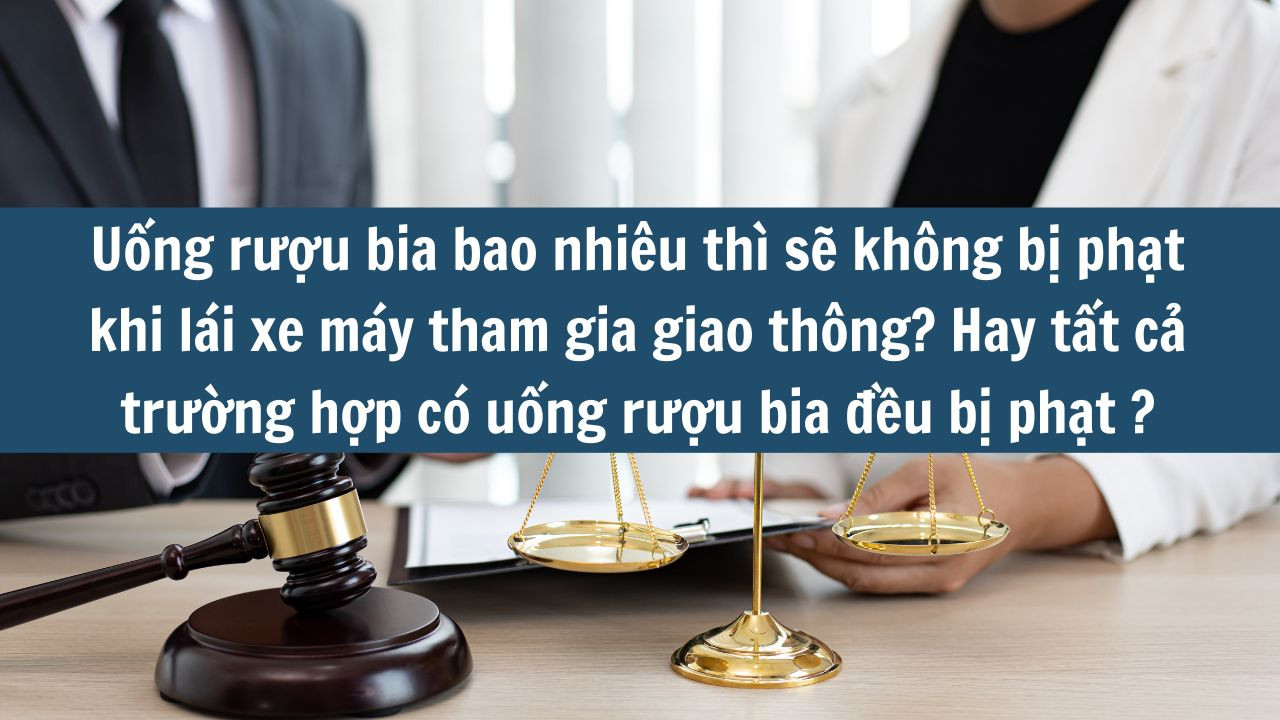
Uống rượu bia bao nhiêu thì sẽ không bị phạt khi lái xe máy tham gia giao thông? Hay tất cả trường hợp có uống rượu bia đều bị phạt mới nhất 2025?
Uống rượu bia bao nhiêu thì không bị phạt khi lái xe máy? Đây là câu hỏi được nhiều người quan tâm khi tham gia giao thông. Theo quy định pháp luật hiện hành, liệu có ngưỡng nồng độ cồn an toàn hay mọi trường hợp sử dụng rượu bia đều bị xử phạt? Bài viết này sẽ giải đáp chi tiết và cập nhật những quy định mới nhất về nồng độ cồn đối với người điều khiển xe máy. 06/01/2025Nồng độ cồn 0.53 phạt bao nhiêu tiền mới nhất 2025?
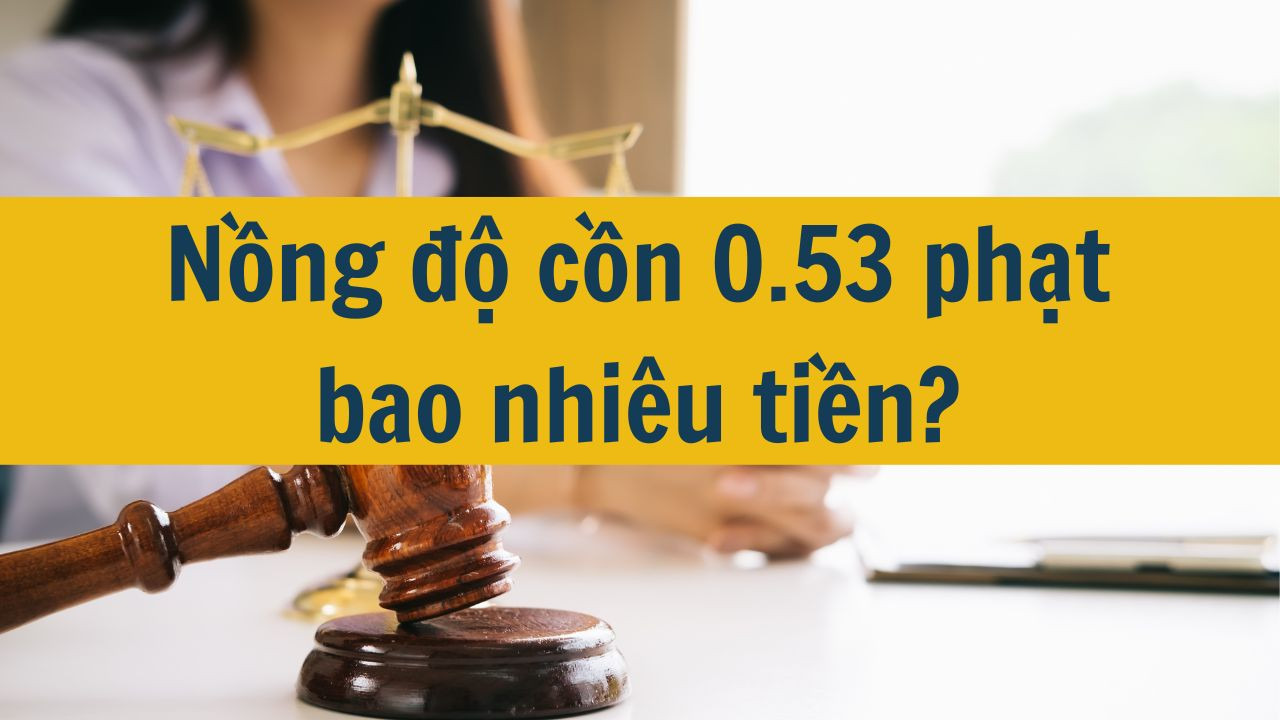
Nồng độ cồn 0.53 phạt bao nhiêu tiền mới nhất 2025?
Nồng độ cồn 0.53 là mức vi phạm phổ biến khi tham gia giao thông. Tuy nhiên, mức phạt đối với vi phạm này sẽ phụ thuộc vào các quy định hiện hành của pháp luật. Trong bài viết này, chúng tôi sẽ cung cấp thông tin chi tiết về mức phạt khi bị phát hiện vi phạm nồng độ cồn 0.53, giúp bạn hiểu rõ hơn về các hình thức xử lý vi phạm giao thông liên quan đến rượu bia. 21/01/2025Nồng độ cồn 4.5 phạt bao nhiêu tiền mới nhất 2025?
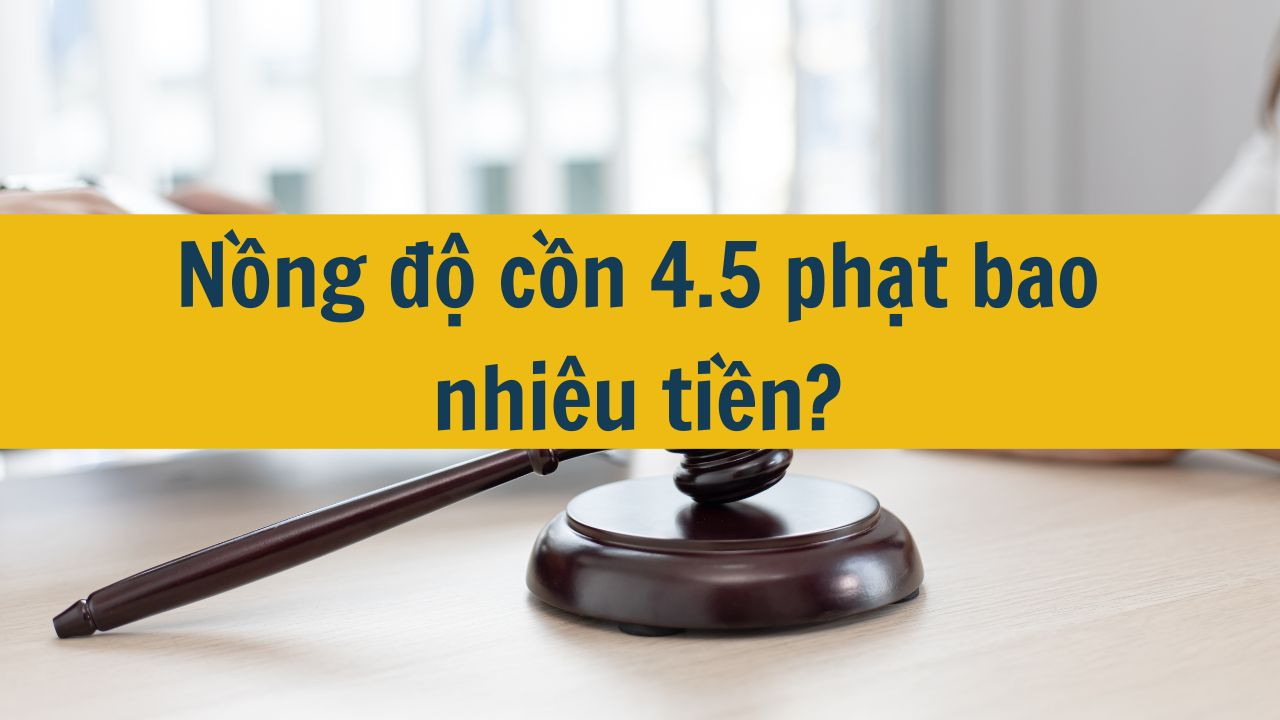
Nồng độ cồn 4.5 phạt bao nhiêu tiền mới nhất 2025?
Nồng độ cồn 4.5 là mức vi phạm phổ biến khi tham gia giao thông. Điều này không chỉ gây nguy hiểm cho bản thân và người khác mà còn bị xử lý nghiêm khắc theo quy định pháp luật. Vậy nồng độ cồn 4.5 sẽ bị phạt bao nhiêu tiền? Cùng tìm hiểu mức phạt và các quy định liên quan trong bài viết dưới đây để hiểu rõ hơn về quyền lợi và nghĩa vụ khi tham gia giao thông 21/01/2025Nồng độ cồn 0.47 phạt bao nhiêu tiền mới nhất 2025?
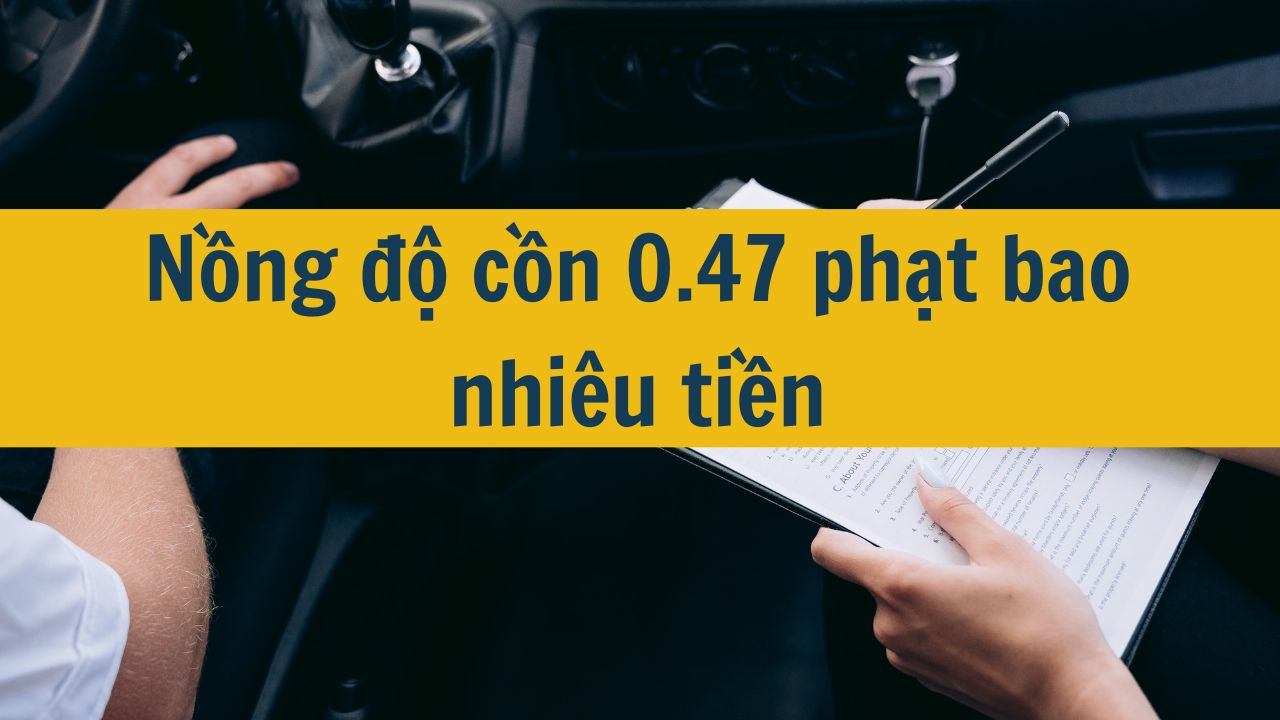
Nồng độ cồn 0.47 phạt bao nhiêu tiền mới nhất 2025?
Khi điều khiển phương tiện giao thông, nồng độ cồn vượt quá mức cho phép có thể gây ra hậu quả nghiêm trọng. Vậy nếu nồng độ cồn là 0.47, người vi phạm sẽ bị xử phạt như thế nào? Bài viết dưới đây sẽ giúp bạn hiểu rõ về mức phạt, quy định của pháp luật liên quan và cách thức xử lý đối với hành vi này. 21/01/2025Mức phạt nồng độ cồn xe máy dưới 0,4 mới nhất 2025
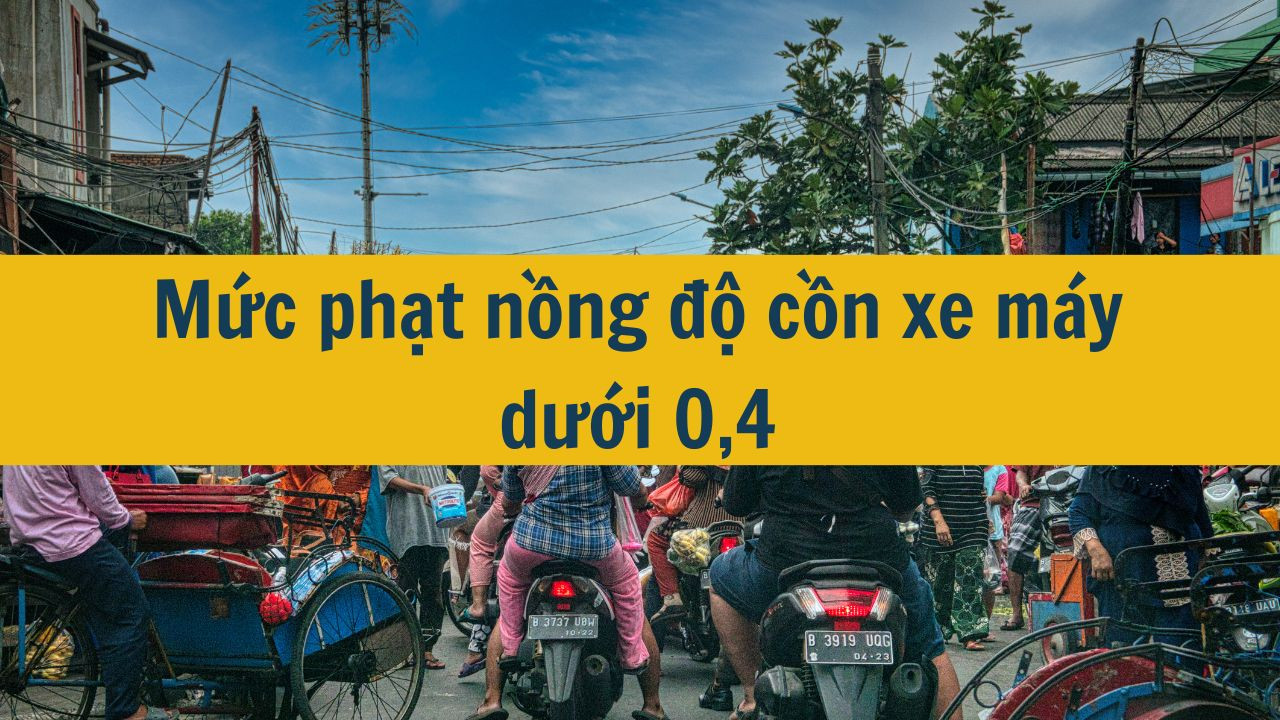

 Luật xử lý vi phạm hành chính 2012 (Bản Word)
Luật xử lý vi phạm hành chính 2012 (Bản Word)
 Luật xử lý vi phạm hành chính 2012 (Bản Pdf)
Luật xử lý vi phạm hành chính 2012 (Bản Pdf)